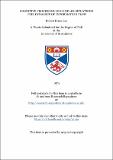Files in this item
Cognitive processing in complex situations : the dynamics of information flow
Item metadata
| dc.contributor.advisor | Jeeves, Malcolm A. | |
| dc.contributor.author | Lee, Robert Bruce | |
| dc.coverage.spatial | 265 p. | en_US |
| dc.date.accessioned | 2018-07-09T14:38:45Z | |
| dc.date.available | 2018-07-09T14:38:45Z | |
| dc.date.issued | 1974 | |
| dc.identifier.uri | https://hdl.handle.net/10023/15139 | |
| dc.description.abstract | The thesis describes and develops a new theoretical approach to the study of human cognitive processing performance in complex situation so this approach utilises and integrates existing theoretical and empirical data from a number of traditionally separate areas of Information processing psychology, such as cognition, perception, memory, imagery, skill and vigilance. Contemporary cognitive psychology considers perception, memory and imagery as functionally inter-related and inter-dependent processes characterised by active, constructive, conscious information processing. In the present thesis the implications of this view are extended, in that this processing is considered to occupy the cognitive processing capacity of the subject in qualitatively the same way as does normal decision-making, problem-solving, or conscious Internalised thought processing of any kind. The theoretical approach of the thesis stresses and accepts the functional inter-relationship and inter-dependence of the various higher mental processes, and is primarily concerned with the sustained dynamic performance properties of the total system. The nature of the research emphasis and direction of the thesis originates from the author's direct concern with applied problems resulting from the increasing cognitive load imposed upon human operators in present complex man-machine systems, such as jet aircraft, for example. Performance failure of the human operator in these systems often has very serious consequences. There is a critical lack of knowledge regarding the fundamental nature and limitations of human information processing in such situations. The basic motivation behind the work reported in the thesis was that, in order to study meaningfully the relevant aspects of the applied situation, further pure research, both theoretical and empirical, had to be undertaken to clarify particular issues. A new conceptual approach to vigilance-type situations is suggested by the theory developed in the thesis, A task was devised in which the signals to be detected were clearly visible, but embedded at random in complex visual patterns (photographs). These patterns were presented on a television screen at regular intervals, over 600 times to subjects during a single testing session. At each of these presentations subjects had to respond with respect to the identification of the picture shown; and to the presence or absence of a signal within it. From the theory it was predicted that where the complex pattern remained the same throughout the testing session, signal detection performance would show a typical vigilance decrement. However, when the set of possible pictures in which the signal may or may not be embedded is vastly increased, and the subject' has to respond at each event in the manner described, it was predicted that signal detection performance would be significantly improved in relation to the single picture condition. These predictions were empirically confirmed at a highly significant level. (On the basis of visual signal-to-noise ratios only, a signal detection analysis of the experimental situation would predict a result opposite to that actually obtained in the experiment). A computer simulation program based on fundamental theoretical ideas outlined in the thesis was developed. The program was used to simulate the vigilance experiment reported in the dissertation. The purpose and implications of the use of this technique as an applied research tool are discussed. The final chapter discusses the results achieved, and outlines the proposed application of the theoretical ideas, and empirical results of the research to the cognitive load problems of human operators in real man-machine systems, in particular aircrew flying advanced jet aircraft. | en_US |
| dc.language.iso | en | en_US |
| dc.publisher | University of St Andrews | |
| dc.subject.lcc | BF433.L3 | en |
| dc.subject.lcsh | General factor (Psychology) | en |
| dc.title | Cognitive processing in complex situations : the dynamics of information flow | en_US |
| dc.type | Thesis | en_US |
| dc.type.qualificationlevel | Doctoral | en_US |
| dc.type.qualificationname | PhD Doctor of Philosophy | en_US |
| dc.publisher.institution | The University of St Andrews | en_US |
This item appears in the following Collection(s)
Items in the St Andrews Research Repository are protected by copyright, with all rights reserved, unless otherwise indicated.

